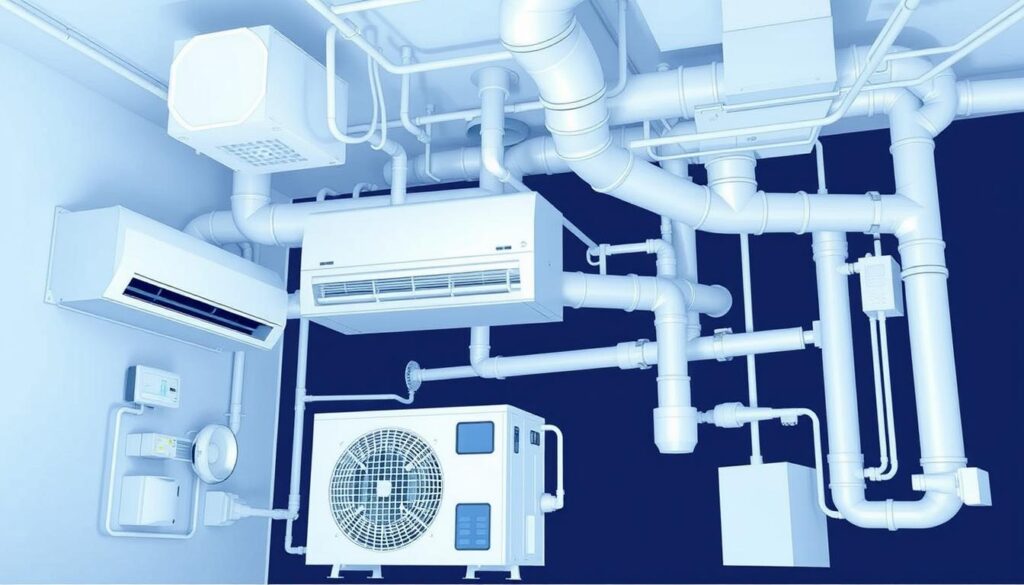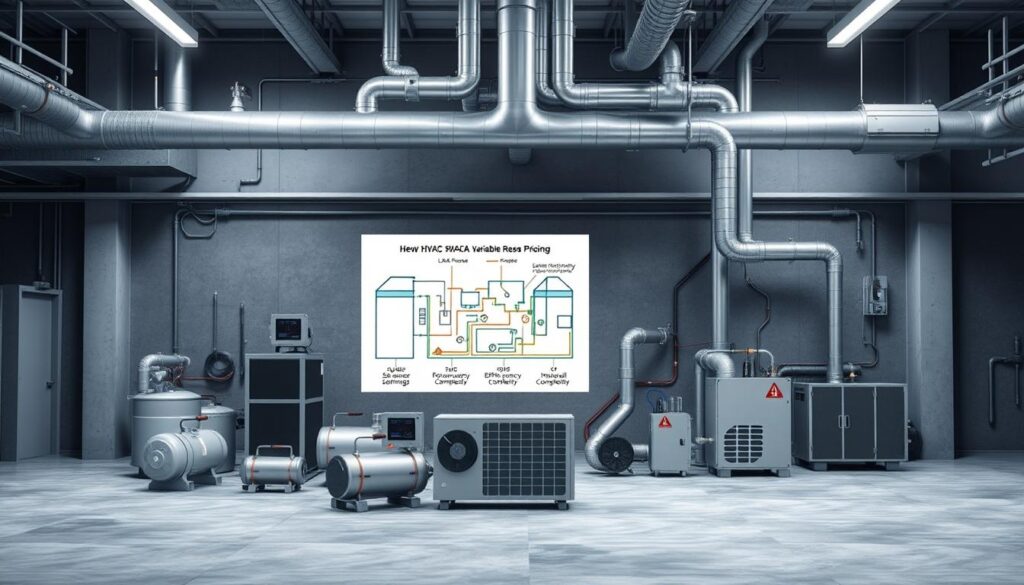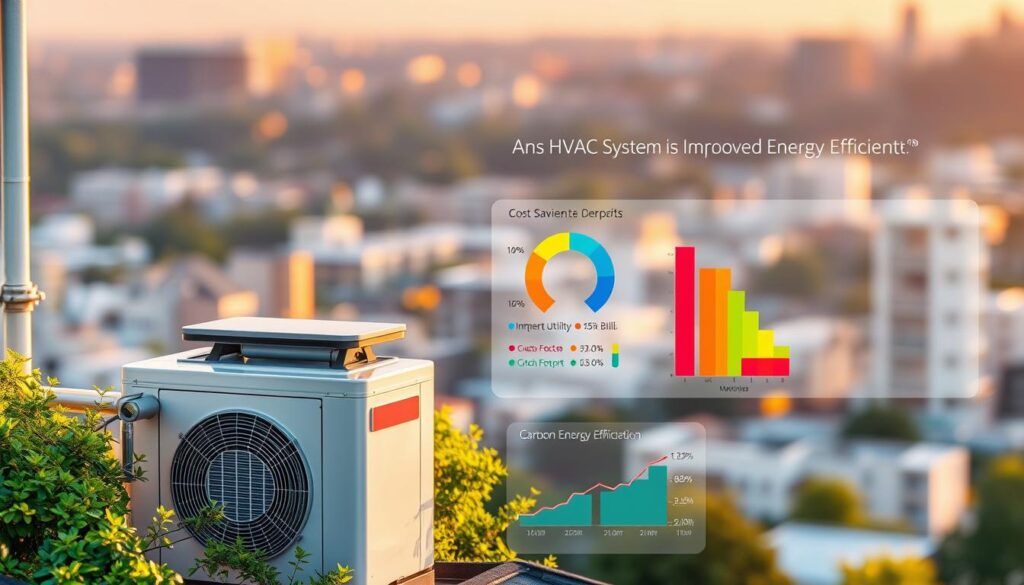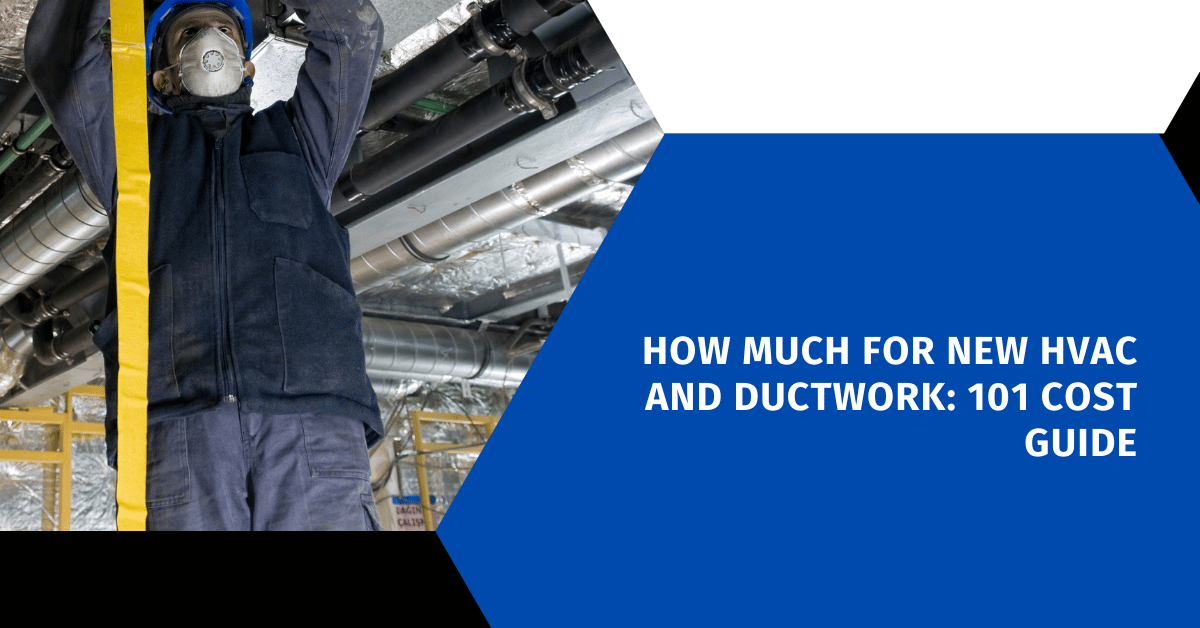Affiliate Disclosure
HVAC Guide Guys is a participant in the Amazon Services LLC Associates Program, an affiliate advertising program designed to provide a means for sites to earn advertising fees by advertising and linking to Amazon.
How Much for New HVAC and Ductwork? Are you curious about the cost of a new HVAC system for your home? Figuring out the cost of a new HVAC can seem like a puzzle. There are many factors and expenses to consider.

Getting a new heating, ventilation, and air conditioning system is a big decision. It affects your comfort and your budget. The cost for a new HVAC and ductwork usually falls between $5,000 and $12,500. This depends on several important factors.
This guide will help you understand the cost of replacing your HVAC system. We’ll look at the main things that affect the price. You’ll get clear information to help you choose the best option for your home’s comfort system.
Key Takeaways
- Average HVAC replacement costs range from $5,000 to $12,500
- Home size and layout significantly impact installation expenses
- Energy efficiency ratings affect overall system pricing
- Ductwork condition plays a critical role in total project cost
- Professional assessment is essential for accurate budgeting
Table of Contents
Understanding HVAC Systems and Their Components
Your home’s comfort depends on a complex network of heating, ventilation, and air conditioning (HVAC) systems. Knowing the parts of these systems is key when thinking about new ductwork. It helps you make smart choices about hvac system pricing.
HVAC systems do more than just control the temperature. They are a complex network of parts designed to make your indoor space perfect.
Core Components of Modern HVAC Systems
A typical HVAC system has several important parts:
- Heating unit (furnace or heat pump)
- Cooling unit (air conditioner)
- Ventilation system
- Thermostat and control mechanisms
The Role of Ductwork in HVAC Performance
Ductwork is like the circulatory system of your HVAC setup. Good design and installation of ductwork are key to system efficiency and performance. Bad ducts can make your system less effective and raise energy costs.
System Integration and Efficiency Factors
Good HVAC performance needs all parts working together well. Things like the right size, insulation, and where ducts are placed are very important. They help get the most energy efficiency and comfort.
When planning new ductwork, getting a professional’s opinion is a good idea. They can help design your system for the best performance and cost savings in hvac system pricing.
Explore Our HVAC Shop
Looking for top-rated HVAC tools, parts, and accessories? Visit our shop and find the perfect solution for your needs.
Visit the ShopAverage HVAC Installation Costs Breakdown
Knowing how much an HVAC upgrade costs is key to a good budget. Replacing an HVAC system can cost between $5,000 and $11,000. This depends on several important factors.
Different types of HVAC systems have their own price ranges. Here’s a look at the average costs:
- Central Air Conditioning: $3,500 – $7,500
- Furnace Replacement: $2,500 – $6,000
- Heat Pump Systems: $4,000 – $8,000
- Ductwork Installation: $1,500 – $5,000
Your budget will depend on a few key things:
- Home size
- System efficiency
- Local labor costs
- Equipment brand and quality
“Investing in a high-efficiency HVAC system can save you money in the long run through reduced energy consumption.” – ENERGY STAR
| System Type | Average Cost Range | Estimated Lifespan |
|---|---|---|
| Split System AC | $3,000 – $7,000 | 15-20 years |
| Packaged HVAC | $4,000 – $8,500 | 10-15 years |
| Ductless Mini-Split | $2,000 – $5,500 | 10-20 years |
Pro tip: Always get multiple quotes and consider long-term energy efficiency when planning your HVAC upgrade expenses.
Explore Our HVAC Shop
Looking for top-rated HVAC tools, parts, and accessories? Visit our shop and find the perfect solution for your needs.
Visit the ShopHow Much for New HVAC and Ductwork: Complete Price Analysis
Understanding the costs of HVAC and ductwork replacement is key to budgeting for home improvements. Prices vary based on several factors that affect your total cost.
When upgrading your HVAC system, you’ll face different expense categories. Knowing these helps you see where your money goes during a full system replacement.
Labor Costs and Installation Fees
Professional installation is a big part of the total cost. Labor fees can range from $500 to $2,500. This depends on:
- Installation complexity
- Home size
- Local labor rates
- System type and setup
Equipment and Material Expenses
Ductwork replacement costs depend on key components. Material choice is very important. You’ll need to spend on:
- HVAC unit ($3,000 – $7,000)
- Ductwork materials ($10 – $25 per foot)
- Ventilation parts
- Insulation
Additional Installation Requirements
Some projects need extra work, raising costs. You might face expenses for structural changes, electrical work, or permits. Always add 10-15% for unexpected costs.
Pro tip: Get multiple quotes from certified HVAC pros for the best prices and service.
Factors Affecting HVAC and Ductwork Pricing

Knowing what affects hvac retrofit estimates helps you make smart choices. Several important factors influence the cost of your HVAC and ductwork project.
- Home Size and Layout: Your home’s size and layout affect the system’s power and installation complexity
- System Efficiency Ratings (SEER)
- Brand Selection and Quality
- Installation Complexity
Your home’s unique features greatly impact the cost. Bigger homes need more powerful systems, raising both equipment and labor costs. The Seasonal Energy Efficiency Ratio (SEER) is key in measuring a system’s energy use.
| SEER Rating | Energy Efficiency | Estimated Cost Impact |
|---|---|---|
| 13-14 | Standard Efficiency | Base Price Range |
| 15-16 | High Efficiency | 10-15% Price Increase |
| 17-20 | Premium Efficiency | 20-30% Price Increase |
“Investing in a higher SEER rating can lead to long-term energy savings and reduced utility bills.”
Choosing a brand also affects your costs. High-end brands might cost more but offer better reliability and warranties. Professional installation is key to managing costs, ensuring your system works well.
When upgrading your HVAC, think about these factors. They help balance initial costs with long-term savings and comfort.
Explore Our HVAC Shop
Looking for top-rated HVAC tools, parts, and accessories? Visit our shop and find the perfect solution for your needs.
Visit the ShopDuctwork Replacement and Modification Costs
Homeowners need to know how much for new HVAC and ductwork. Ductwork is key for air circulation and temperature control in your home.
Ductwork issues can hurt your home’s comfort and energy use. Spotting problems early can save money and prevent bigger damage.
Common Ductwork Problems
- Air leaks and poor sealing
- Accumulated dust and debris
- Inadequate insulation
- Physical damage or corrosion
- Improper sizing or design
Material Options and Their Costs
Ductwork materials vary in price and performance. Your choice affects the cost of new ductwork.
- Flexible Ductwork: Most affordable, $1-$3 per linear foot
- Sheet Metal Ducts: Durable, $4-$7 per linear foot
- Fiberglass Duct Board: Good insulation, $3-$5 per linear foot
Installation Complexity Considerations
The complexity of ductwork installation affects costs. Home layout, accessibility, and existing infrastructure are key factors.
According to HomeGuide, new ductwork can add up to $5,000 to your HVAC system upgrade, potentially increasing overall project costs by one-third.
Knowing these factors helps you plan your HVAC system and budget for ductwork replacements.
Energy Efficiency and Long-term Cost Benefits

Getting an energy-efficient HVAC system can change your home’s comfort and wallet. The cost might seem high at first, but the savings over time are big. High-efficiency systems cut down on energy costs, making up for the initial cost.
Here are the main perks of energy-efficient HVAC systems:
- Lower monthly energy bills
- Smaller carbon footprint
- Better home comfort
- Possible tax credits and rebates
The Seasonal Energy Efficiency Ratio (SEER) is key when checking system efficiency. Higher SEER means better performance but costs more. Your local weather affects if a high-efficiency system is worth it financially.
Energy-efficient HVAC systems usually give you:
- 15-30% less energy use
- Steadier indoor temperatures
- Quieter running
- Longer equipment life
Before picking a system, figure out the long-term savings. Compare energy efficiency ratings and local energy prices. Some people pay off their initial cost in 5-7 years with lower energy bills.
Smart homeowners see HVAC investments as long-term financial plans, not just quick buys.
Choosing the Right HVAC System for Your Home
Choosing the right HVAC system is key to your home’s comfort and cost. It affects your budget and energy use over time.
Today, homeowners have many HVAC options. Each has its own benefits for different homes and climates.
Understanding System Size and Capacity
Getting the right system size is vital. The wrong size can cause:
- More energy use
- Uneven heating or cooling
- Higher upkeep costs
- Shorter system life
Climate-Specific System Selection
Your local weather affects your HVAC choice. Different areas need special systems for comfort.
- Hot Humid Regions: Choose systems that remove moisture well
- Cold Climates: Opt for efficient heat pumps
- Moderate Zones: Split systems are versatile
Talking to an HVAC expert can guide you. They help you find a balance between comfort, efficiency, and cost.
Cost-Saving Strategies for HVAC Installation
To lower your HVAC installation costs, plan carefully and make smart choices. The right steps can greatly reduce your expenses.
Smart homeowners prepare well to control HVAC costs. Here are some effective ways to save:
- Get multiple quotes from certified HVAC professionals
- Schedule installations during off-peak seasons
- Research available rebates and tax incentives
- Consider energy-efficient system models
Timing is key to saving on HVAC costs. Winter and early spring are cheaper because demand is lower. Contractors often offer better prices during these times.
“The best time to invest in your HVAC system is before it becomes an emergency.” – HVAC Industry Expert
Looking for financial help can also cut your costs. Many utility companies and government programs offer:
- Energy efficiency rebates
- Tax credits for green upgrades
- Financing options with low interest rates
Regular maintenance is a long-term savings plan. Annual professional checks can prevent costly repairs and extend your system’s life by up to 15 years.
Pro tip: Always ask about warranty coverage and possible package deals when discussing your HVAC installation.
Explore Our HVAC Shop
Looking for top-rated HVAC tools, parts, and accessories? Visit our shop and find the perfect solution for your needs.
Visit the ShopWhen to Replace Your HVAC System and Ductwork
Knowing when to replace your HVAC system and ductwork can save you a lot of money. ENERGY STAR suggests getting hvac retrofit estimates every 10 to 15 years. It’s important to know the signs of system aging to keep your home comfortable and efficient.
Look out for these signs that it might be time to replace your ductwork:
- System age over 10-15 years
- Increasing energy bills
- Frequent repair needs
- Inconsistent room temperatures
- Unusual noises during operation
Your HVAC system’s performance affects your home’s comfort and energy use. Older systems are less efficient, leading to higher bills and poor air quality. A professional can tell you if a full replacement or repairs are better for your wallet.
Ductwork condition is also key. Damaged or leaky ducts can cut system efficiency by up to 20%. Look for signs like dust, holes, or disconnected parts that need fixing.
Proactive maintenance and timely replacements can save homeowners thousands in long-term energy and repair costs.
Conclusion
Understanding HVAC system pricing can be tough, but it’s key to making smart choices. Your home’s comfort and energy use depend on picking the right system. It’s all about finding a balance between the cost now and how well it works later.
When you think about upgrading your HVAC, don’t just look at the price. Think about how efficient it is, how well it’s installed, and if it fits your home. Getting expert advice and planning carefully can help you get the best deal.
Next, get quotes from certified HVAC pros, check energy ratings, and figure out what your home needs. This way, you’ll get a system that keeps you comfortable, saves on energy, and adds value to your home.
If you’re watching your budget, don’t worry. Look around, compare, and choose trusted contractors who know your local climate and home needs. With the right planning, upgrading your HVAC can be a wise and affordable choice for your home.

